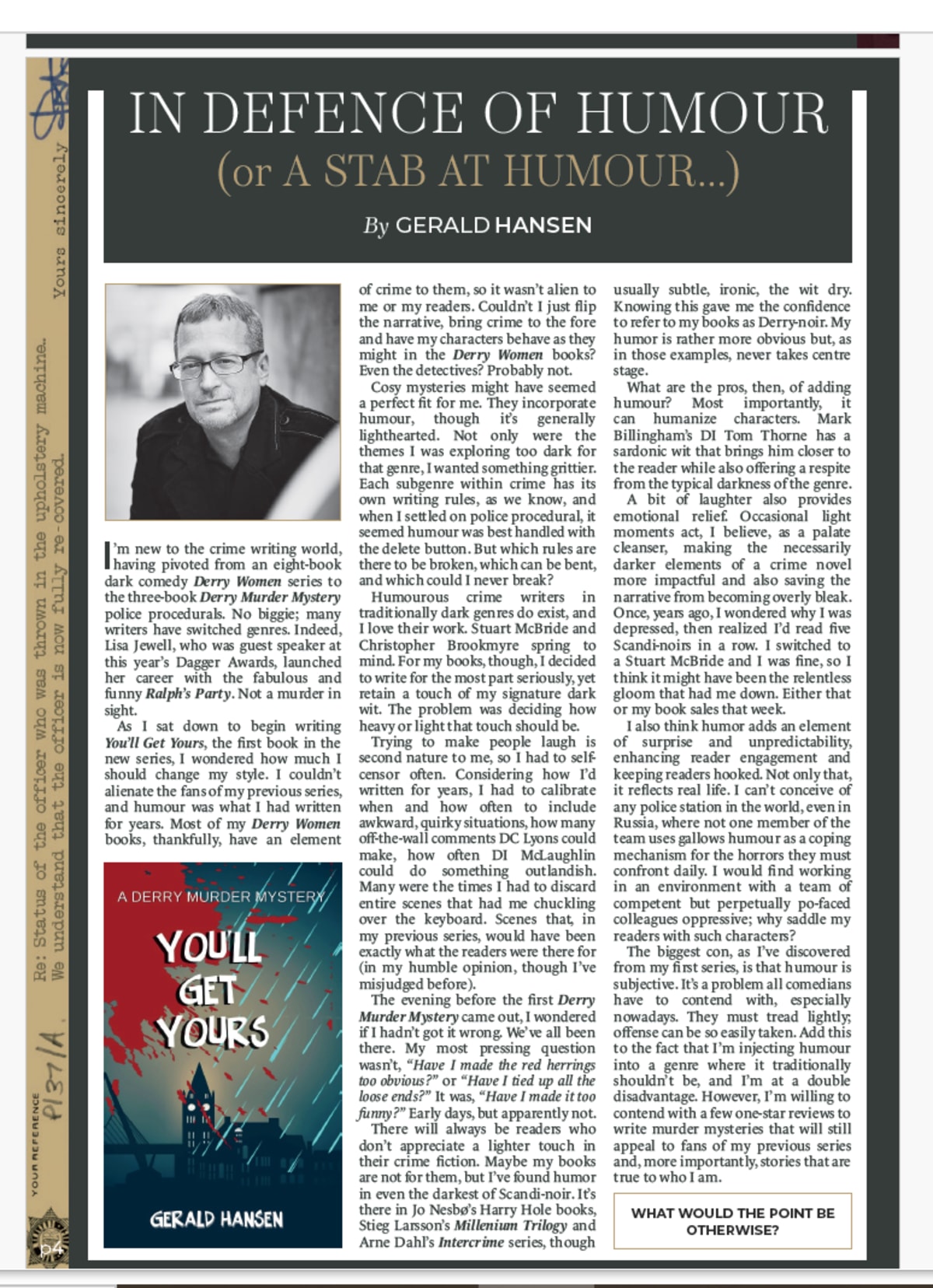You wait forever for a bus, and then two show up at once!! CWA has two magazines, and I have this article in their Red Herrings, which is for all the members. Page four! And listed on the cover! Woo hoo! Getting my name out there! Yay! There's no link available, so here's the article:
In Defense of Humour/A Stab at Humour
I’m new to the crime writing world, having pivoted from an eight-book dark comedy Derry Women series to the three-book Derry Murder Mystery police procedurals. No biggie; many writers have switched genres. Indeed, Lisa Jewell, who was guest speaker at this year’s Dagger Awards, launched her career with the fabulous and funny Ralph’s Party. Not a murder in sight.
As I sat down to begin writing You’ll Get Yours, the first book in the new series, I wondered how much I should change my style. I couldn’t alienate the fans of my previous series, and humour was what I had written for years. Most of my Derry Women books, thankfully, have an element of crime to them, so it wasn’t alien to me or my readers. Couldn’t I just flip the narrative, bring crime to the fore and have my characters behave as they might in the Derry Women books? Even the detectives? Probably not.
Cosy mysteries might have seemed a perfect fit for me. They incorporate humour, though it’s generally lighthearted. Not only were the themes I was exploring too dark for that genre, I wanted something grittier. Each subgenre within crime has its own writing rules, as we know, and when I settled on police procedural, it seemed humour was best handled with the delete button. But which rules are there to be broken, which can be bent, and which could I never break?
Humourous crime writers in traditionally dark genres do exist, and I love their work. Stuart McBride and Christopher Brookmyre spring to mind. For my books, though, I decided to write for the most part seriously, yet retain a touch of my signature dark wit. The problem was deciding how heavy or light that touch should be.
Trying to make people laugh is second nature to me, so I had to self-censor often. Considering how I’d written for years, I had to calibrate when and how often to include awkward, quirky situations, how many off-the-wall comments DC Lyons could make, how often DI McLaughlin could do something outlandish. Many were the times I had to discard entire scenes that had me chuckling over the keyboard. Scenes that, in my previous series, would have been exactly what the readers were there for (in my humble opinion, though I’ve misjudged before).
The evening before the first Derry Murder Mystery came out, I wondered if I hadn’t got it wrong. We’ve all been there. My most pressing question wasn’t ‘Have I made the red herrings too obvious?’ or ‘Have I tied up all the loose ends?’ It was ‘Have I made it too funny?’ Early days, but apparently not.
There will always be readers who don’t appreciate a lighter touch in their crime fiction. Maybe my books are not for them, but I’ve found humor in even the darkest of Scandi-noir. It’s there in Jo Nesbø’s Harry Hole books, Stieg Larsson’s Millenium Trilogy and Arne Dahl’s Intercrime series, though usually subtle, ironic, the wit dry. Knowing this gave me the confidence to refer to my books as Derry-noir. My humor is rather more obvious but, as in those examples, never takes centre stage.
What are the pros, then, of adding humour? Most importantly, it can humanize characters. Mark Billingham’s DI Tom Thorne has a sardonic wit that brings him closer to the reader while also offering a respite from the typical darkness of the genre.
A bit of laughter also provides emotional relief. Occasional light moments act, I believe, as a palate cleanser, making the necessarily darker elements of a crime novel more impactful and also saving the narrative from becoming overly bleak. Once, years ago, I wondered why I was depressed, then realized I’d read five Scandi-noirs in a row. I switched to a Stuart McBride and I was fine, so I think it might have been the relentless gloom that had me down. Either that or my book sales that week.
I also think humor adds an element of surprise and unpredictability, enhancing reader engagement and keeping readers hooked. Not only that, it reflects real life. I can’t conceive of any police station in the world, even in Russia, where not one member of the team uses gallows humour as a coping mechanism for the horrors they must confront daily. I would find working in an environment
with a team of competent but perpetually po-faced colleagues oppressive; why saddle my readers with such characters?
The biggest con, as I’ve discovered from my first series, is that humour is subjective. It’s a problem all comedians have to contend with, especially nowadays. They must tread lightly; offense can be so easily taken. Add this to the fact that I’m injecting humour into a genre where it traditionally shouldn’t be, and I’m at a double disadvantage. However, I’m willing to contend with a few one-star reviews to write murder mysteries that will still appeal to fans of my previous series and, more importantly, stories that are true to who I am. What would the point be otherwise?
